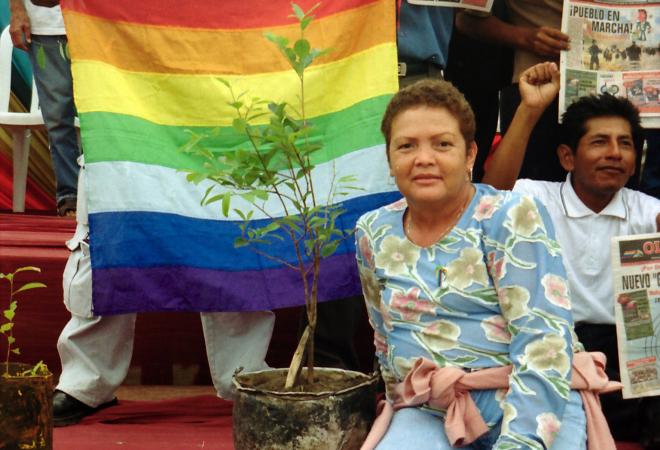Women and the war on drugs
Published on April, 39 2016
Omayra Morales, former coca grower from Colombia, speaks at a coca farmers congress in Lima Peru in 2004. Credit: Transnational Institute
By Robin Lloyd, Burlington VT Branch
I will be a representative of WILPF International to the UN General Assembly Special Session on Drugs on April 19-20. The special importance of this month’s meeting rests in the role of the UN in setting drug policy worldwide.
The legal prohibition of cannabis, coca and poppy plants is determined at the highest level by the UN’s Single Convention on Narcotic Drugs of 1961. In 1970, Richard Nixon signed the legislation implementing national prohibition in compliance with the Convention, the Comprehensive Drug Abuse Prevention and Control Act.
(Top Nixon adviser: We invented the war on drugs to vilify blacks, hippies. Harper's April 2016)
So just to make that clear, US drug policy is determined by a United Nations Convention.
A potentially momentous reconsideration of that Convention will be taking place this April in New York City at the second United National General Assembly Special Session on Drugs (UNGASS).
I attended the first UNGASS in 1998 as part of the effort by the Women’s International League for Peace and Freedom to change policy and especially to assert our position that ending the war on drugs is a women’s issue.
Why? There are many things wrong with this War – its racism, its reliance on military solutions – but one not frequently mentioned is its impact on women.
The War on Drugs condones a form of macho violence. In earlier decades, that violence was played out between cops and robbers, then cowboys and Indians, and now the DEA and narco traffickers. The War allows men to find an excuse to be violent and to militarize societies. Women lose in time of war, no matter what George Bush says. And what are the results of criminalizing a natural human desire to change consciousness? A massive international slush fund of illegal money funding brothels, gun running, bribes, and casinos: all endeavors that are not much fun for women.
The legal enforcement of prohibition leads to racism and punitive incarceration. On the supply side, the chaos caused when Latin American governments, bullied by the US, agree to spray farmers’ land to destroy coca crops – without asking their permission of course - in the middle of a civil war, has been an ongoing environmental tragedy and political disaster.
I accompanied a WILPF delegation to Colombia in 1996 and documented our meetings with the courageous but melancholy victims of the war: women heartbroken that their sons were forced to join a paramilitary group to kill other women’s sons who had joined the guerillas. A high point of our visit was a meeting with the secretary of the Small Coca Farmers Cooperative, Omayra Morales. She met us at a human rights center in Bogota carrying a small suitcase. Like an Avon door-to-door saleswoman, she set out the healing lotions and teas made from the coca plant and described their beneficent uses.
WILPF, under the leadership of executive director Marilyn Clement organized a 1998 tour by Morales and other women from coca-producing countries to US cities, where they met with women from US cities affected by drug addiction and the war on drugs. This was documented in Peace & Freedom (pp 6-8) and a video.
Morales and officials from the Andean Council of Coca Leaf Growers presented a statement to the first UNGASS in 1998: "Andean coca growers are against drug consumption in the North and South and we are declared enemies of drug trafficking and its corrupting and violent effects. We ratify that for us and for millions of people in our countries coca is not cocaine, coca growers are not drug traffickers and the coca leaf consumer is not a drug addict." Democracy Now
It was moving to hear poor people speaking the truth in those august halls. But did anyone really listen? What was the outcome of that first UNGASS? Titled “A Drug-Free World — We Can Do It!”, President Clinton cajoled the rest of the world into increasing the military response to drug use. The US government was happy to assist Latin American countries in acquiring high speed motor boats for interdiction and low cost loans to build prisons for drug offenders (and anyone else who offended the state).
A lot of drugs have passed under the bridge since that time. This April, UNGASS II will take place in a much changed atmosphere. According to the Transnational Institute, UNGASS 2016 is an unparalleled opportunity to put an end to the horrors of the drug war and instead prioritize health, human rights, and safety..WILPF’s attempt to speak truth to power before UNGASS 1 was a low profile, grassroots effort. By contrast, this April, survivors and victims of this war, north and south, will be traveling as part of a much more robust caravan, starting in Honduras, to present their case to the UN. Sponsored by Global Exchange, with a large grant from George Soros’s Open Society, this movement for freedom from government oppression has a chance to be a game changer.
To follow the Caravan, and for information on UNGASS, please go to http://www.globalexchange.org/programs/caravan-peace-life-and-justice.
The board of WILPF US endorsed a statement on drugs in 2001 and another one in 2011.
For my commentary on the upcoming UGASS session see Global Exchange.
For more information contact Robinlloyd8@gmail.com.



